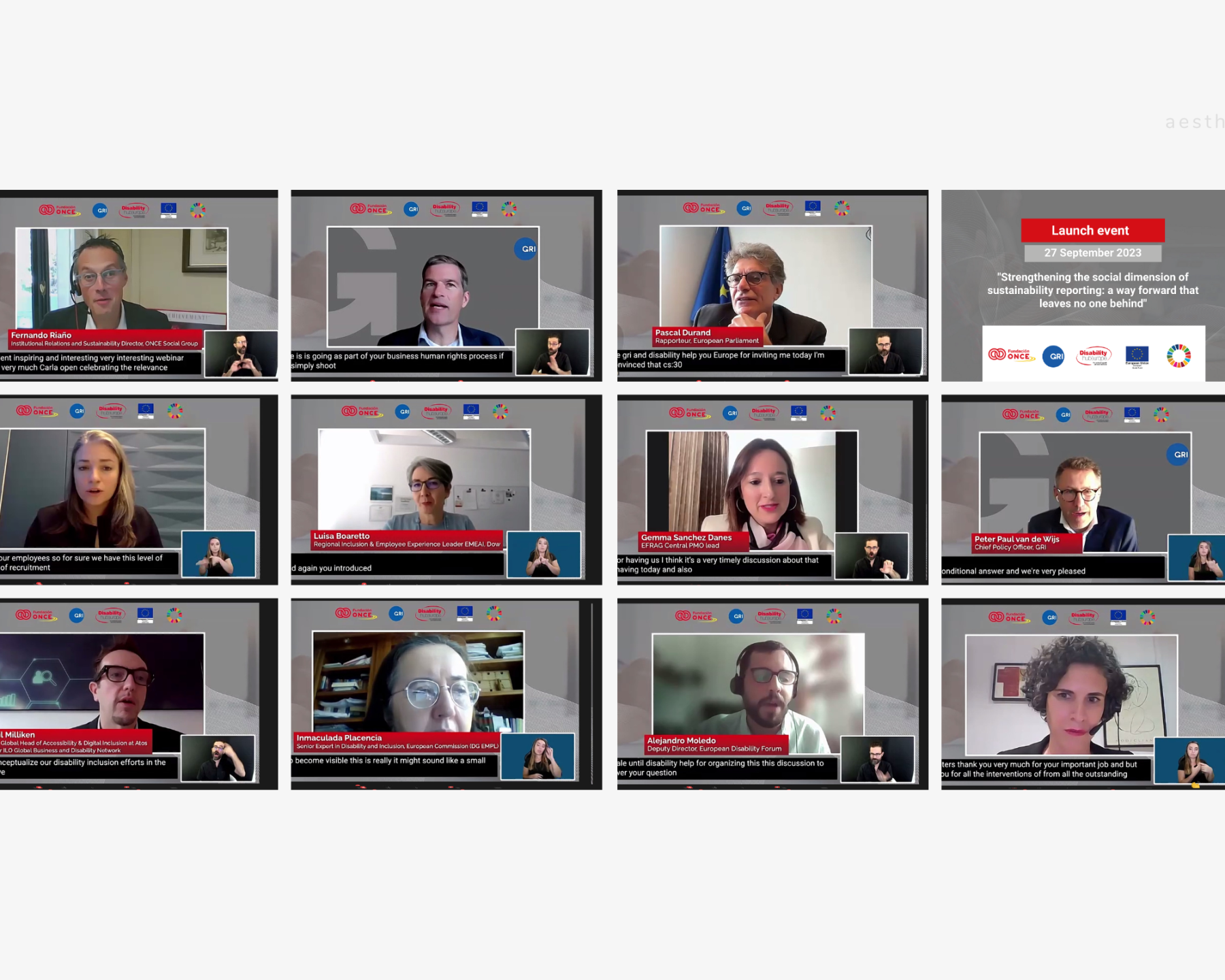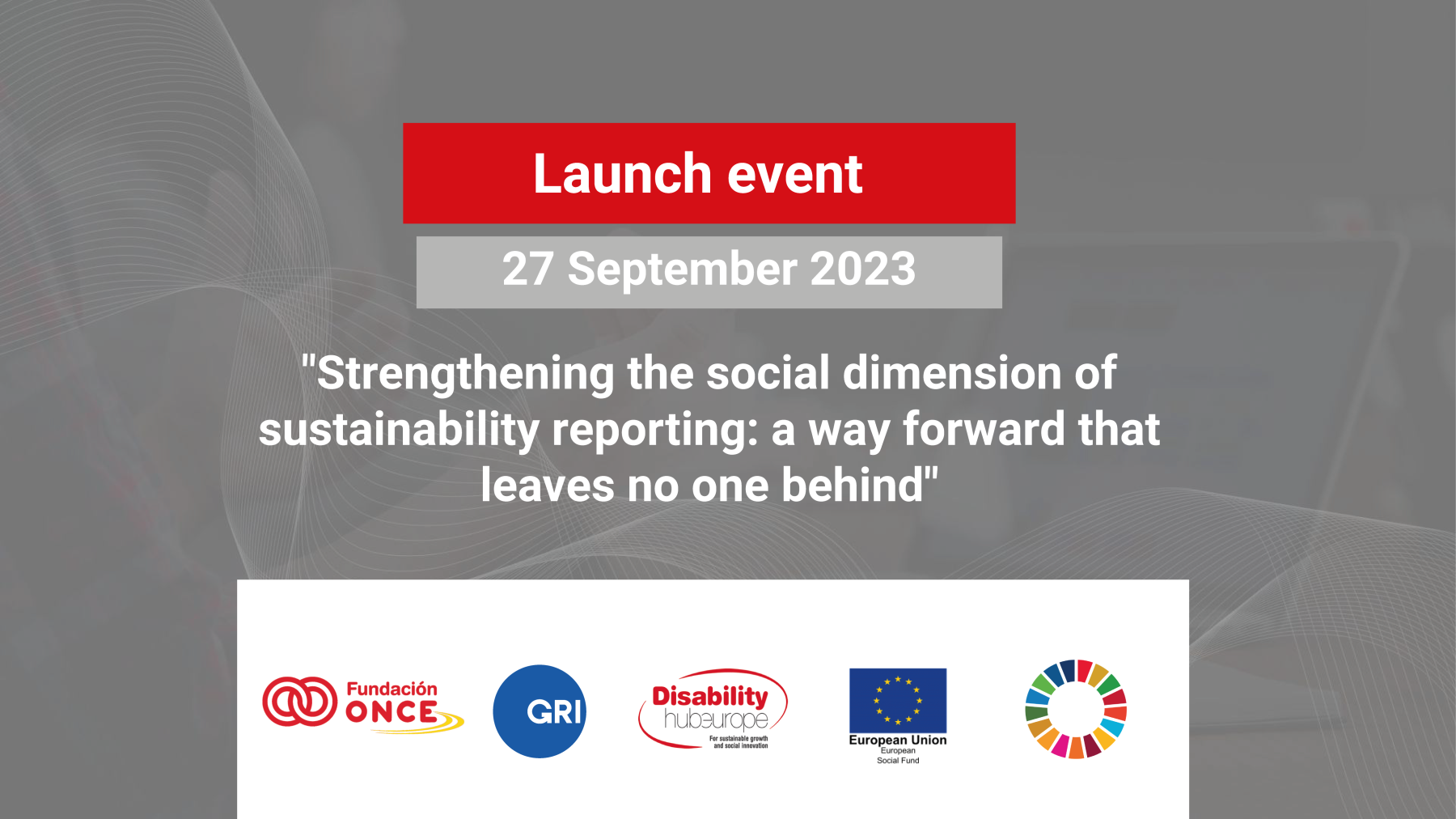Sustainability reporting has evolved significantly, transitioning from a supplementary corporate practice to an integral component of corporate governance and disclosure. Amidst this evolution, the social dimension of sustainability reporting has emerged as a pivotal aspect. This article provides an in-depth analysis of a recent webinar titled 'STRENGTHENING THE SOCIAL DIMENSION OF SUSTAINABILITY REPORTING: A WAY FORWARD THAT LEAVES NO ONE BEHIND' where esteemed experts offered profound insights into this critical facet of sustainability reporting.
The webinar featured engaging roundtable discussions that offered participants the opportunity to delve deeper into topics such as the increasing prominence of the social dimension in sustainability reporting, human rights due diligence, and the imperative of fostering disability-inclusive organizations.
You can watch the webinar here:
You can watch the full program of the webinar in this link
Fernando Riaño, representing ONCE Group emphasized the paramount significance of reporting standars and its role in advancing disability inclusion within the sustainability agenda of organizations. He underscored the noteworthy contribution of the ONCE Foundation in this space with the publication of an international guide on disability within sustainability reporting back in 2015. Furthermore, Mr. Riaño highlighted the Disability Hub Europe project's recognition of the potential of sustainability reporting in realizing ESG (Environmental, Social, and Governance) objectives.
Harold Pauwels, GRI (Global Reporting Initiative Standards), shed light on the value of incorporating social sustainability reporting as a means to advance the recognition of human rights. He emphasized that the social dimension should be seamlessly integrated into all corporate processes, fostering a holistic approach towards sustainability.
Pascal Durand, European Parliament, delved into the transformative dynamics unfolding within the corporate landscape, driven by transparency and solidarity. He eloquently discussed the evolving corporate ethos, where transparency of information and solidarity among businesses play pivotal roles in fostering sustainability.
Gemma Sanchez-Danes, EFRAG (European Financial Reporting Advisory Group), highlighted the ambitious directives aimed at elevating social and environmental considerations within sustainability reporting. She advocated for the generation of transparent and high-quality information, a crucial prerequisite for meaningful sustainability reporting.
Peter Paul van de Wijs, GRI Secretariat, shared a comprehensive overview of GRI's commitment to addressing social sustainability for over 25 years. He underscored the synergistic relationship between social and financial information and highlighted the European Union's efforts to facilitate transparent non-financial reporting.
Luisa Boaretto, representing Dow, emphasized the critical role of data measurement and interpretation in fostering authentic inclusion, even within B2B (Business-to-Business) enterprises. She highlighted the necessity for a comprehensive approach that encompasses both internal corporate culture and collaborative engagement with external suppliers.
Anahi Lafon, speaking on behalf of L'Oréal, provided insights into the organization's sustainable practices. She spotlighted L'Oréal's leadership in implementing talent acquisition programs dedicated to promoting inclusivity. The organization's unwavering commitment to cultivating inclusive beauty across all stakeholder levels was a notable highlight.
Neil Milliken, Atos, elucidated the alignment of corporate endeavors with the United Nations' Sustainable Development Goals (SDGs). He emphasized the dynamic shift in approaching accessibility and the profound significance of inclusion within corporate operations.
Alejandro Moledo, EDF (European Disability Forum), underscored the critical importance of comprehensive policies related to inclusion and accessibility. This foundational knowledge is indispensable for catalyzing transformative changes within organizations.
Inmaculada Placencia, European Commission, emphasized the integral role of individuals with disabilities in the corporate sphere. Their active involvement in all participation processes is imperative for shaping strategies that genuinely benefit them.
Carla Bonino, concluding the event on behalf of Fundacion ONCE, expressed gratitude to attendees and panelists for their contributions. She underscored the heightened significance of social values in the contemporary landscape and urged steadfast commitment to both environmental (green) and social value creation as well as the deepening connectivity between both dimensions. In her closing remarks, she advocated for the establishment of an inclusive, equitable, and socially responsible work ecosystem.

Conclusion:
In essence, the webinar served as a catalyst for further exploration of the evolving landscape of sustainability reporting, with a pronounced emphasis on the social dimension. As the corporate world continues to adapt to dynamic societal demands, integrating social sustainability into core business practices is no longer an option but a necessity for organizations committed to leaving no one behind in the pursuit of a sustainable future.








